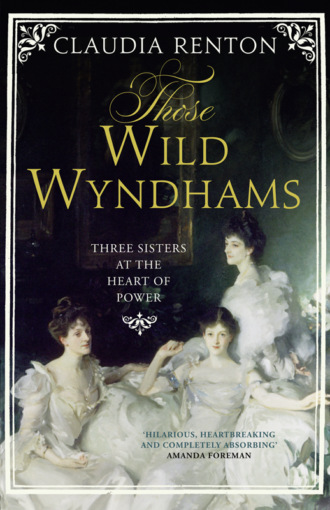
Полная версия
Those Wild Wyndhams: Three Sisters at the Heart of Power
On that opening night, however, the great critic Ruskin was mostly struck by Whistler’s effrontery in exhibiting work with so little apparent finish. ‘I have seen, and heard, much of Cockney impudence before now but never expected to hear a coxcomb ask two hundred guineas for flinging a pot of paint in the public’s face,’ he wrote in Fors Clavigera. Whistler sued for libel, claiming inter alia that since Ruskin’s review he had not been able to achieve a price comparable to that which Percy paid for his Nocturne. Mary, like the art world, was agog: ‘so funny’, she wrote in her diary, ‘the jury going to Westminster Palace Hotel to examine the pictures, and hearing Mr. Burne-Jones, Whistler, W. M. Rossetti and all of them in the witness box’.59
Six months later, Madeline Wyndham took Mary and George, home for the holidays, to Leighton House for one of Leighton’s famed chamber-music afternoons that introduced rising musical stars – Hallé, Piatti, Joachim – to Society. Among the guests was Arthur Balfour, in his early thirties, Conservative Member for Hertford.
Balfour, the man who once said ‘Nothing matters very much, and most things don’t matter at all,’ was already renowned for his languidness. Despite six years in the Commons, he was not to make his political name until the next ministry, as a member of the maverick quartet known as the Fourth Party, led by Lord Randolph Churchill, who devoted their time in opposition to harassing the Liberal Government and their own ineffectual Leader in the Commons, Sir Stafford Northcote.
However, Balfour was already a prime target for ambitious Society matrons seeking to marry off their daughters. He was impeccably connected through his mother, and the favourite nephew of Lord Salisbury, the gloomy refusenik of the Reform Act who was now a serious contender to take over from the elderly Disraeli when the latter retired. From his dead father Balfour had inherited a nabob fortune – the term used to describe those whose riches came from working for the East India Company in the Indian sub-continent – and the prosperous Whittingehame estate. Balfour was not one who thought politics should govern life. He maintained a keen interest in philosophy – the best known of his works, Foundations of Belief, was published in 1895 – and held musical concerts at his own house, 4 Carlton Gardens, for which he had recently commissioned Burne-Jones to create a series of murals.
Above all, the tall, dark-haired, humorous Balfour was charming: ‘He has but to smile and men and women fall prone at his feet,’ said his close friend Mary Gladstone, who had been besotted with him for years60 and whose father William considered him a protégé, despite their opposing political stances. Fifty years later, the Liberal MP Howard Begbie commented caustically on Balfour’s undimmed charm: ‘I have seen many [people] retire from shaking his hand with a flush of pride on their faces as though Royalty had stooped to inquire after the measles of their youngest child.’61 Some years later, when Mary Wyndham was newly married, a friend would comment worriedly on her attitude towards Arthur: ‘he fascinates her – her attitude is that of looking up in wonder … Thinks him good …’62 Mary and George’s shared fascination with Balfour began the day they met him. Their lives would ever after be entwined with his. And an elderly Balfour, attempting an autobiography, would put down his pen at precisely the moment he met the seventeen-year-old Mary Wyndham among the chattering crowds at Leighton House.63
Конец ознакомительного фрагмента.
Текст предоставлен ООО «ЛитРес».
Прочитайте эту книгу целиком, купив полную легальную версию на ЛитРес.
Безопасно оплатить книгу можно банковской картой Visa, MasterCard, Maestro, со счета мобильного телефона, с платежного терминала, в салоне МТС или Связной, через PayPal, WebMoney, Яндекс.Деньги, QIWI Кошелек, бонусными картами или другим удобным Вам способом.


